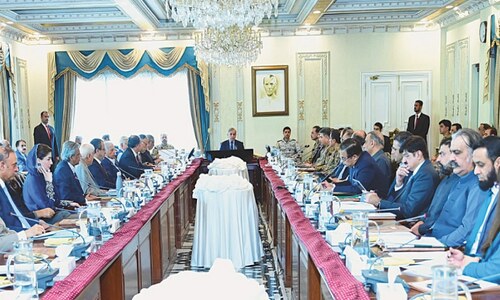TEHRAN, Nov 6: The United Nations special envoy for Afghanistan, Lakhdar Brahimi, said here on Tuesday that he is compiling a report from his talks in Pakistan and Iran for next week’s 6+2 meeting on the political future in Afghanistan.
Formed in 1998, the 6+2 is a United Nations supervised grouping comprising the six neighbouring states of Afghanistan - Pakistan, China, Iran, Tajikistan, Turkmenistan and Uzbekistan - plus the United States and Russia.
Next week’s meeting of the 6+2 will not only have increased significance due to the ongoing war in Afghanistan, but will also oblige the foreign ministers of the two political arch-enemies, Iran and the United States, to sit at one table and listen to each other’s viewpoints.
“The 6+2 has so far failed to achieve any fruitful results but I hope that this will change,” said Brahimi, who was in the same post in 1998 but quit the job due to lack of cooperation by the Taliban.
Brahimi’s report, which will be completed after his talks with former Afghan King Zahir Khan in Rome, will be the main basis for the New York talks next week.
Also during his renewed tenure, Brahimi showed no visible interest to hold talks with the Taliban due to lack of attention by the world opinion. “We have tried for more than twenty times to talk to the Taliban ... but every time in vain,” he said.
He rejected once again charges that the United Nations is acting as the political wing of the American military scheme and said that the UN was seeking to prevent a human catastrophe in Afghanistan rather than play a political game.
“We hope that Afghanistan’s neighbouring countries, especially Iran and Pakistan, aid the UN in enabling formation of a stable political structure in the country through the will of the Afghan nation,” he said.
UN sources in Tehran said that Brahimi faced once again differences within Afghan opposition forces in Tehran, including those close to the Northern Alliance, whose initial enthusiasm and unity is gradually decreasing due to the less fruitful results of US air strikes.
He also heard Iran’s opposition to “an imposed Afghan regime from outside”, referring to the return of the former Afghan king, but is said to have told the Iranian side to focus the attention more on the fate of the Afghan nation rather than political and ideological considerations.
Brahimi is also said to have rejected premature plans for the UN in Afghanistan at the current juncture, such as deployment of peacekeeping forces, and rather wait until the results of the current operations and the future of Taliban are clarified.—dpa














































Dear visitor, the comments section is undergoing an overhaul and will return soon.